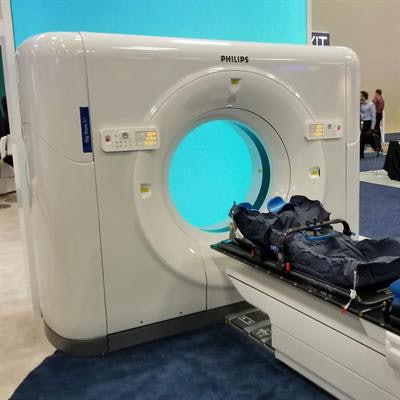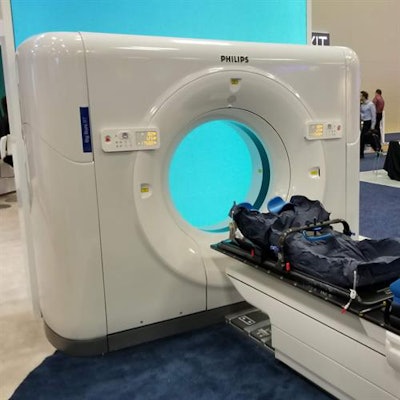
SAN ANTONIO - Philips Healthcare is launching several new products at this week's American Society for Radiation Oncology (ASTRO) meeting, including new CT and MR scanners dedicated to performing radiation therapy simulation.
Big Bore RT represents the latest generation of the company's CT simulation platform and is the successor to Big Bore CT, the previous generation. The new scanner includes a variety of improvements designed to boost the quality of images being used for CT simulation, according to the company.
 Big Bore RT from Philips.
Big Bore RT from Philips.For example, Big Bore RT sports a more powerful 80-kW x-ray generator, compared with the 60-kW version found on Big Bore CT. This will result in better-quality images, particularly of obese patients. The new scanner also features dual-energy imaging.
Big Bore RT also supports Philips' iterative model reconstruction (IMR) protocol. In diagnostic radiology, IMR is typically used to reduce radiation dose, but for oncology simulation it's useful for producing higher-quality images, which can help delineate very small structures. Reconstruction speeds for IMR images are less than three minutes, the company noted. Big Bore RT shipments will begin in the second quarter of 2019.
MRI treatment planning is beginning to gain favor, and Philips is highlighting improvements in this realm as well, launching the Ingenia MR-RT line of scanners for MRI-based simulation. The line includes the Ingenia Elition 3.0T MR-RT and Ambition X 1.5T MR-RT systems.
Both scanners include Philips' Compressed SENSE technique, a data processing application that reduces 2D and 3D scan times by up to 50%, according to the company. The Ambition X scanner includes Philips' BlueSeal magnet, which supports helium-free operation and does not require a quench vent pipe, making it easier to site near radiation therapy systems. The scanner also includes an MRI-only treatment package. The scanners will begin shipping in the first quarter of 2018.
In the realm of software, Philips has given its Pinnacle Evolution treatment planning software an upgrade. The workstation includes Personalized Planning, which integrates automated planning tools from Sun Nuclear's PlanIQ software designed to improve the assessment of treatment feasibility and provide more efficient therapy planning workflow, enabling clinicians to quickly create patient-specific, high-quality therapy plans, according to the company.
Pinnacle Evolution also includes the company's new intensity-modulated radiotherapy (IMRT) and volumetric-modulated arc therapy (VMAT) optimization technology. Philips replaced the previous Pinnacle optimizers, a move that improves the speed of Pinnacle's performance while maintaining high-quality treatment plans. The new version of Pinnacle Evolution will begin shipping in the second quarter of 2019.


















